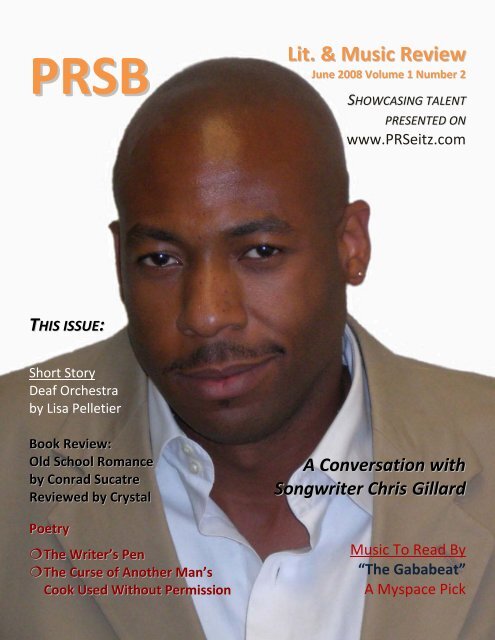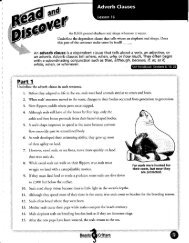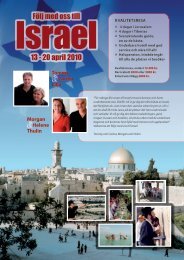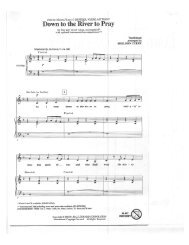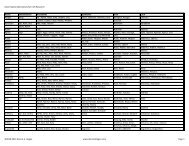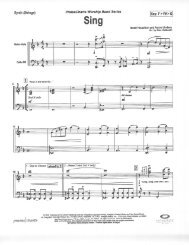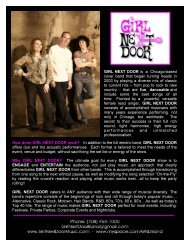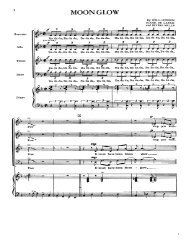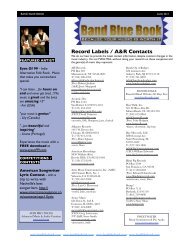Lit. & Music Review - Bandzoogle
Lit. & Music Review - Bandzoogle
Lit. & Music Review - Bandzoogle
Create successful ePaper yourself
Turn your PDF publications into a flip-book with our unique Google optimized e-Paper software.
PRSB<br />
THIS ISSUE:<br />
Short Story<br />
Deaf Orchestra<br />
by Lisa Pelletier<br />
Book <strong>Review</strong>:<br />
Old School Romance<br />
by Conrad Sucatre<br />
<strong>Review</strong>ed by Crystal<br />
Poetry<br />
The Writer’s Pen<br />
The Curse of Another Man’s<br />
Cook Used Without Permission<br />
<strong>Lit</strong>. & <strong>Music</strong> <strong>Review</strong><br />
June 2008 Volume 1 Number 2<br />
SHOWCASING TALENT<br />
PRESENTED ON<br />
www.PRSeitz.com<br />
A Conversation with<br />
Songwriter Chris Gillard<br />
<strong>Music</strong> To Read By<br />
“The Gababeat”<br />
A Myspace Pick
PRSB<br />
June 22008<br />
Volume 1 Number 2<br />
Coverr:<br />
Chris Gillard – read more in n the<br />
Conveersations<br />
sectioon.<br />
This monthly perioodical<br />
is spons sored<br />
in fuull<br />
by P.R. Seitz Books seller,<br />
wwww.prseitz.com.<br />
1541 Lemoine Ave SSte<br />
4E<br />
Fort LLee,<br />
NJ 07024<br />
Owneership<br />
of all poetry and short s<br />
storiees<br />
remain withh<br />
the authors. . The<br />
authoors<br />
have posted<br />
a sample of their<br />
workss<br />
on www.prseeitz.com<br />
along with<br />
their respective conntact<br />
details, if f you<br />
like thheir<br />
work, pleaase<br />
write to the em.<br />
Authoors<br />
interestedd<br />
in submit tting,<br />
please<br />
contact prseitz@hotmail.co<br />
om.<br />
All hyyperlinks<br />
and pictures are active a<br />
whenn<br />
reading in ooriginal<br />
Adobe e pdf<br />
formaat<br />
and connectted<br />
to the inte ernet.<br />
If youu<br />
want to view more on any topic, t<br />
simplly<br />
run your curssor<br />
over the tit tle or<br />
picturre<br />
to be instantly<br />
transported d.<br />
Aroound<br />
the WWeb<br />
The UUltimate<br />
NYC PPoetry<br />
Calendar<br />
If you<br />
live in Neww<br />
York or are e just<br />
passinng<br />
through annd<br />
feel the nee ed to<br />
expreess<br />
yourself by<br />
open mike, , this<br />
calendar<br />
is just whaat<br />
you need. Clubs C<br />
throuughout<br />
Manhattan<br />
and the other o<br />
four bboroughs<br />
submmit<br />
their sched dules<br />
to thee<br />
web master who then pres sents<br />
everyything<br />
in a handy cale endar<br />
formaat.<br />
wwww.prseitz.ccom<br />
<strong>Lit</strong>. & Mus sic <strong>Review</strong>w<br />
Editor’s CCorner<br />
TThis<br />
month we have<br />
ssome<br />
excellent<br />
sselections<br />
foor<br />
your<br />
eenjoyment.<br />
In this<br />
eedition<br />
we open up<br />
aanother<br />
sectioon<br />
called<br />
“ “Conversations”<br />
where we’ ’ll have a<br />
cchat<br />
with aan<br />
author, poet or<br />
ssongwriter.<br />
TThere<br />
is a funnny<br />
notion that <strong>Lit</strong>erature<br />
iis<br />
about peopple,<br />
the humaan<br />
gift of<br />
eexpression.<br />
Thhat<br />
it is about emotions,<br />
aambitions<br />
andd<br />
the drives thhat<br />
create<br />
oour<br />
lives. In tthat<br />
sense, litterature<br />
is<br />
not about greaat<br />
works of thee<br />
past that<br />
wwe<br />
must studdy<br />
in school bbut<br />
about<br />
ggreat<br />
works off<br />
the present, tthat<br />
shape<br />
oour<br />
thoughts aand<br />
ideas. Yett,<br />
past and<br />
present can coo‐mingle<br />
I recently readd<br />
Faust for the first time.<br />
From the boook<br />
covers and<br />
other<br />
media that surround<br />
us, I expected<br />
a<br />
ffull<br />
and very serious gothiic<br />
tale. I<br />
tthought<br />
it woould<br />
take some<br />
time to<br />
sstruggle<br />
throuugh<br />
but, like a teaspoon<br />
oof<br />
medicine, itt<br />
would be apppreciated<br />
wwhen<br />
finished.<br />
I was pleasanttly<br />
surprised. I read it in<br />
a single sittingg<br />
completely unable to<br />
put it downn;<br />
even hearrd<br />
myself<br />
laughing at ceertain<br />
passagees.<br />
Not<br />
ggiving<br />
away thhe<br />
story but I was very<br />
ssurprised<br />
that pre‐marital seex<br />
played<br />
TThe<br />
Writ<br />
TThe<br />
Writ is a wwriter’s<br />
workshhop,<br />
and a<br />
sshowcase.<br />
A person can become<br />
ddelightfully<br />
lost<br />
amid the rraw<br />
talent<br />
ddisplayed<br />
at every<br />
click. Froom<br />
Poetry<br />
tto<br />
songwritinng,<br />
short stoories<br />
and<br />
eeverything<br />
in bbetween,<br />
some<br />
may say<br />
tthe<br />
content iis<br />
ambitious bbut<br />
really<br />
not, The Writ is highly focused,<br />
upon<br />
tthe<br />
delicious sensory<br />
of wordds.<br />
June 2008 Vol. 1 No. 2<br />
a central role in the pplot.<br />
Written inn<br />
the earlyy<br />
nineteenth century, thee<br />
book readd<br />
as lively and contemporaryy<br />
as any current<br />
work. Was this thee<br />
same ‘Faaust’<br />
touted by academicss;<br />
how could<br />
it be so enjoyyed?<br />
Because it was about<br />
people; thee<br />
experiencces<br />
and concerns<br />
of 2000<br />
years aggo<br />
are still oour<br />
emotionaal<br />
struggles today. A lessson<br />
learned; I<br />
will put more faith in the words<br />
written oon<br />
the page, tthan<br />
upon thee<br />
false reveerence<br />
of the mmedia.<br />
Loki Listens<br />
Loki Listeens<br />
is a blogg<br />
that carries<br />
along like<br />
a traveler with no cleaar<br />
destinatioon.<br />
Like that traveler, thee<br />
reader is brought alongg<br />
simply for thee<br />
enjoymennt<br />
of the ridee,<br />
seeing neww<br />
things aloong<br />
with old tthings<br />
but noww<br />
from a neew<br />
and different<br />
perspectivee;<br />
finally, a bblog<br />
where thee<br />
writer likes too<br />
write andd<br />
the reader rambles.<br />
Page | 1
PRSB <strong>Lit</strong>. & <strong>Music</strong> <strong>Review</strong><br />
Poetry<br />
June 2008 Vol. 1 No. 2<br />
The Writer’s Pen<br />
by Ella Wahab<br />
A forgotten evening;<br />
A single star;<br />
A night of futile bliss;<br />
The issues of nature<br />
call to each their own<br />
And the writer's pen submits.<br />
To record dreams on canvas<br />
pleasures forsaken<br />
and tokens long forborne;<br />
and to plead the moment<br />
the fleeting moment<br />
to remain ere it is gone.<br />
Stories of passion;<br />
Stories of tragedy;<br />
Stories of sprites and hallow'd send<br />
will seek out this poet's page<br />
ere the night meets end<br />
The Curse of Another Man’s Cook<br />
Used Without Permission<br />
by Michael Walker<br />
Oh I can resist temptation!<br />
Alpo! That’s the po!<br />
I can withstand anything but<br />
repetition<br />
After it, they’re all of a suit<br />
So damnit I can stand not dinning on<br />
your dinner tonight<br />
Pioneers, Theorists, Showboaters<br />
What I can’t stand is repetition<br />
Form two lines ‐ everybody signs<br />
I can’t make a stand<br />
My favorite rhyme?<br />
Can’t cope my friend<br />
“Twenty years?! Judge Judge<br />
Can’t take it<br />
That ain’t no time<br />
Downwind a well‐fed young winner<br />
My daddy’s in Folsom doin’ 99”<br />
Take her out tonight son<br />
Have mercy on the soul of this hungry<br />
old sinner<br />
www.prseitz.com<br />
Short Story<br />
Deaf Orchestra<br />
by Lisa Pelletier<br />
As Astrid strolled into the common<br />
kitchen of International House, she<br />
smelled the aromas of onions and<br />
peppers sautéing in the iron<br />
casserole. When she caught sight of<br />
the illicit wine bottles lined up along<br />
the stove, she smiled. Diego had<br />
somehow managed to smuggle them<br />
past the keen eyes of the resident<br />
assistants. Actually, this wasn't so<br />
hard, since the RA's were guilty of<br />
pilfering a glass or two on Friday<br />
nights.<br />
On Fridays, the Supper Club gathered<br />
for its weekly Saternalian rites. Astrid<br />
took a mental picture of the room,<br />
noting the balloons that filled the<br />
ceiling and the hallways leading down<br />
to the basement. As if Diego had just<br />
nudged her in the ribs and winked,<br />
she understood the language of the<br />
balloons. Diego had filled the halls of<br />
house with them from the high<br />
Moorish ceiling of the living room all<br />
the way down to the cellar where<br />
they would descend after supper for<br />
dancing and intimate conversations.<br />
Astrid took off her shoes and placed<br />
her hands on the wall. As she<br />
suspected, there was music in the<br />
background; someone had put on a<br />
CD. The cooks were already dancing<br />
to the lounge/dub beats of a<br />
Lebanese band. From the resonating<br />
walls and floor, Astrid felt the<br />
rhythms of the drum through the<br />
soles of her feet and palms. As the<br />
vibrations flooded up through the<br />
floor, penetrating her body, she<br />
swayed to the syncopated beats.<br />
Slowly, at first, she began to move to<br />
the sensual rhythms of the dumbek,<br />
rocking in time to vibes she heard<br />
only in her head. Watching her, Diego<br />
jumped up, grasped a balloon off the<br />
ceiling, and bounced it towards<br />
Astrid, who caught it in mid‐flight.<br />
Feeling the flesh of the balloon<br />
between her fingers, she sensed the<br />
high and low tones of the oud and<br />
dumbek, playing counterpoint to each<br />
other.<br />
As the music eased into a slow,<br />
sinuous taxim, she suddenly<br />
remembered her first date with<br />
Diego. Of all things, he had taken her<br />
to a concert. His strange obsession<br />
with music didn't phase her much;<br />
she'd had a lifetime of feeling her way<br />
into sound. But this was her first<br />
concert, and she had no idea what to<br />
expect. Diego refused to tell her<br />
where they were going or who the<br />
headliner was, but he promised her<br />
that this concert would be special.<br />
Not wanting to reveal the surprise too<br />
soon, he led her in blindfolded. When<br />
he finally removed the ribbon of cloth<br />
from her eyes, she looked around<br />
excited and expectant.<br />
The first thing she noticed was the<br />
coterie of deaf kids lining the stage.<br />
She was stunned at first. The deaf<br />
community was so small that she<br />
immediately recognized several kids.<br />
The odd thing was that they were all<br />
carrying balloons ‐‐ giant balloons<br />
that bobbed above their heads in a<br />
Page | 2
PRSB <strong>Lit</strong>. & <strong>Music</strong> <strong>Review</strong> June 2008 Vol. 1 No. 2<br />
fantastic array of whimsical color. She<br />
signed excitedly to the kids she knew,<br />
"Hey, what's with the balloons?" But<br />
no one answered, as the lights grew<br />
dim and the band began to saunter on<br />
stage. The last person to enter the<br />
scene was a tall, red‐haired sorceress,<br />
cradling a pair of percussion sticks<br />
between the fingers of one hand.<br />
Barefoot and poised, Evelyn Glennie<br />
crossed the stage, stopping before a<br />
massive drum.<br />
Fascinated, Astrid drew in her breath<br />
as the percussion sticks rained down<br />
on the drumhead. She heard the<br />
conversation between drummer and<br />
drum as it electrified every pore of<br />
her body with sound. She watched<br />
the skin of the drum pulse like a giant<br />
lung…felt the air thicken with the<br />
rhythms of her own beating heart.<br />
Then, as if she had bitten the<br />
proverbial Madeleine, memories<br />
flooded up with the call‐and‐response<br />
as the other musicians joined in. Like<br />
all teenagers, she had spent hours in<br />
her room dancing to VERY LOUD<br />
music, driving her hearing parents<br />
insane. She could almost hear their<br />
desperate shouts: "TURN THAT<br />
DOWN!" She felt the vibrations in<br />
ordinary objects all around her, as a<br />
www.prseitz.com<br />
passing car whizzed through the wine<br />
glass in her hand. On rainy nights, the<br />
hollow wooden door frame was an<br />
Andean rain stick, her father's guitar a<br />
Peruvian drum. From a young age,<br />
she realized that all objects breathed;<br />
she felt their unique rhythms deep in<br />
her core.<br />
As the band heated up, Diego pulled a<br />
shriveled, red balloon from his pants<br />
pocket and began to blow it up. When<br />
it had fully expanded, he held it out to<br />
Astrid like some strange, enticing<br />
flower. As he tied the knot, she took it<br />
between her fingers, and all at once,<br />
she felt it: a sudden, visceral<br />
connection with the music that was<br />
unlike anything she had experienced<br />
before. The balloon vibrated like a<br />
giant lung that concentrated all the<br />
sounds in the stadium, allowing her to<br />
sense individual tones and<br />
confluences of sound all at once.<br />
Through the balloon, Astrid heard the<br />
sounds of an entire orchestra in her<br />
head.<br />
That night, they pulled down every<br />
balloon they could find from the I‐<br />
House rafters, and filled Diego's bed<br />
with them. Diego put on his favorite<br />
jazz album: Dave Holland's<br />
Conference of the Birds. As they lay<br />
there, blind and naked in the dark,<br />
they felt their way to each other<br />
through a sea of balloons. Giddy with<br />
excitement, they felt the pulse of an<br />
entire universe thrum through the<br />
lungs of the balloons that filled their<br />
bed.<br />
© 2007 Lisa Pelletier<br />
Page | 3
PRSB <strong>Lit</strong>. & <strong>Music</strong> <strong>Review</strong><br />
Conversations<br />
June 2008 Vol. 1 No. 2<br />
Chris Gillard, Songwriter<br />
Interviewed by K. Craig<br />
We all know of the image of the<br />
struggling artist, be it author or<br />
songwriter/musician. They are the<br />
ones who sacrifice themselves for<br />
their art, working, living a lifestyle far<br />
removed from suburban posh in order<br />
to express themselves. That’s the<br />
way it has always been, and it has<br />
been deemed something of luck for<br />
the artist to be graciously chosen by<br />
society to “make it big”.<br />
What if that was no longer the<br />
condition under which artists must<br />
work? Chris is a testament that the<br />
artist need not sacrifice everything to<br />
express himself. A confident,<br />
intelligent and handsome man, he has<br />
used the tools available to him to<br />
create a balance that allows him to<br />
choose how he expresses himself to<br />
society without compromise.<br />
I met with Chris in his apartment, a<br />
cramped room packed with electronic<br />
sound equipment.<br />
PRSB: Is it true that musicians get all<br />
the girls?<br />
Chris: (Laughs) No, actually quite the<br />
opposite, most women are either<br />
taught or conditioned by experience<br />
not to date musicians.<br />
PRSB: Do you have a personal<br />
experience with that?<br />
Chris: Yeah, throughout my life<br />
(laughs). Women think the whole idea<br />
of dating a musician is cool and<br />
everything but it’s not. There’s a lot<br />
more to it than they think. A friend of<br />
mine who recently married a musician<br />
said it takes a very certain special kind<br />
of woman to be with a musician.<br />
www.prseitz.com<br />
PRSB: What are some of the things<br />
that they have to worry about?<br />
Chris: They can’t be insecure; they<br />
have to be self sufficient in a lot of<br />
ways because he may not be there<br />
when they need something. I think<br />
women who are not self sufficient<br />
tend to have problems with that.<br />
PRSB: You’ve been trying to get into<br />
the music business for a while, given<br />
that you said that it takes a certain<br />
type woman to be with a man who is<br />
a musician, why do you want to be a<br />
musician, what are some of the things<br />
that are attracting you to this?<br />
[Click the picture to go to YouTube<br />
and see Chris singing “Crazy Love”]<br />
Chris: It’s not really something that<br />
attracts me to it, it is just something I<br />
am. I don’t do this full time, and<br />
haven’t done it full time for several<br />
years. I don’t care what I end up doing<br />
for a job, the music is my work. A job<br />
is just what I do to get money. I’m<br />
always going to do music. No matter<br />
what happens I’m still going to be<br />
doing this. It’s not a hobby, I just<br />
don’t know how to not do it.<br />
PRSB: Would you call it a compulsion?<br />
Chris: At times.<br />
PRSB: Describe the push that draws<br />
you toward writing a song.<br />
Chris: Different things, sometimes it’s<br />
an idea or a situation I experience in<br />
life, a situation I see someone else<br />
experience in their life; a story in the<br />
paper or something I see on the news.<br />
Sometimes it’s just a melody that<br />
pops in my head while I’m brushing<br />
my teeth. There’s no one way that it<br />
happens. The only thing there is to<br />
learn is to be open and be able to<br />
hear it when it comes. That takes<br />
some practice and work in terms of<br />
just letting myself go with those<br />
moments when they happen, as<br />
opposed to trying to judge the idea<br />
before I’ve even fully had it. Like<br />
having a couple of words come to me<br />
and I catch myself saying too soon,<br />
“Ah that’s no good.” Well, how do I<br />
know that for sure? It just popped<br />
into my head, I haven’t really thought<br />
about it yet. For me, part of it is<br />
learning not to start to editorialize too<br />
soon.<br />
PRSB: Would you say it is a form of<br />
personal expression?<br />
Chris: Yes, definitely, it’s not so hard<br />
to write about things I have<br />
experienced but I can’t write about<br />
things that I can’t at least relate to.<br />
Some things I’ve written about that I<br />
haven’t actually experienced but it’s a<br />
situation that I can relate to. As long<br />
as I can relate to it then it is<br />
absolutely a form of expression. It is<br />
one of the more primitive forms of<br />
expression, one of the oldest among<br />
mankind.<br />
PRSB: You said you’d taken a job and<br />
that the job is just a form of money<br />
but you also mentioned that you had<br />
been a musician full time, were you<br />
writing songs or working in a band?<br />
Chris: I was in a band we did some<br />
original material, some covers, a lot of<br />
70’s funk covers, James Brown, Cool<br />
and the Gang, stuff like that. Most of<br />
the original material, most of my<br />
writing was confined to writing lyrics<br />
which is an art unto itself that I<br />
haven’t quite mastered. I didn’t write<br />
much of the music though. So I’ve<br />
spent the last few years learning<br />
music and learning to write and<br />
interpret the melodic ideas that I have<br />
Page | 4
PRSB <strong>Lit</strong>. & <strong>Music</strong> <strong>Review</strong> June 2008 Vol. 1 No. 2<br />
and bringing that back to the<br />
structure of the lyrics; interpreting<br />
that into guitar and bass lines and<br />
learning to play all of that.<br />
PRSB: Describe that period of your life<br />
when you were working full time as a<br />
musician.<br />
Chris: It was very much the<br />
stereotype, very transient; for six<br />
months I didn’t have an apartment. I<br />
lived out of my car, hotel rooms and<br />
from the back of a tour bus. It’s a<br />
liberating lifestyle but it is easy to<br />
become disconnected to everything<br />
because you’re never in one place for<br />
too long. You’re seeing the world but<br />
your world becomes only the three or<br />
four other people you’re traveling<br />
with because they are the only<br />
constants in that life.<br />
PRSB: Where did you travel?<br />
Chris: The southeast mainly, North<br />
Carolina, South Carolina, Georgia,<br />
Florida, Tennessee, Virginia, Alabama,<br />
what they used to call the Chitlin<br />
Circuit. It was interesting.<br />
PRSB: What is the Chitlin Circuit?<br />
Chris: The Chitlin Circuit was a term<br />
that they referred to in the earlier<br />
days of the music industry and during<br />
segregation. If you were a black artist<br />
in those days there were a lot of<br />
venues you couldn’t play. The venues<br />
you could play were in the southeast.<br />
So when a black artist, especially one<br />
just starting out, went on tour they<br />
would play primarily in the southeast.<br />
Segregation was strongest there so<br />
there were more black owned venues<br />
that allowed black performers. That’s<br />
how it got the name. So that’s what<br />
we did. We played more of the<br />
college venues on the circuit.<br />
PRSB: So for a young black performer<br />
trying to make a name for himself, is<br />
it obligatory to go on the circuit?<br />
www.prseitz.com<br />
Chris: Obligatory…, not so much now<br />
a days but before it was, certainly,<br />
long before my time. I think it’s not<br />
obligatory now because there’s so<br />
much more technology that enables<br />
artists to get their music out there<br />
and heard by so many more people<br />
across a wider geographic area<br />
without a big expenditure of money.<br />
Although it’s not obligatory, it is<br />
something that a lot of artists would<br />
benefit from because it is not an easy<br />
thing to do and you learn if you’re<br />
really cut out for this and if you really<br />
love the lifestyle enough to pursue<br />
further. It is definitely one of the<br />
things a lot of artists could benefit<br />
from experiencing; that constant<br />
schedule, every night a new city, a<br />
new venue, a new crowd. A lot of the<br />
times you’re doing the same songs<br />
and that’s a challenge too, not letting<br />
it get stale for you because the<br />
audience can pick up on that<br />
instantly. They know when you’re just<br />
walking through it, when you’re just<br />
phoning it in and they don’t<br />
appreciate that.<br />
PRSB: So is Chris cut out for it?<br />
Chris: Chris is more cut out for it now<br />
than then, just in terms of<br />
preparedness mentally and I’m a<br />
more skilled musician in general so if<br />
put in that situation again I think I<br />
could make more of it than before.<br />
PRSB: Is that why you backed away<br />
when you did?<br />
Chris: For a while, but part of it was<br />
that I wanted to take some time and<br />
become a better musician. When I<br />
started out, I was just a singer; I didn’t<br />
know how to play any instruments.<br />
When I was in that band, one of the<br />
things that I was often frustrated with<br />
was the gap between vocalists and<br />
instrumentalists. In being able to<br />
interpret each other’s ideas and share<br />
a common vocabulary. That was<br />
something that was a real challenge<br />
Page | 5
PRSB <strong>Lit</strong>. & <strong>Music</strong> <strong>Review</strong> June 2008 Vol. 1 No. 2<br />
for me. I didn’t want to be someone<br />
who just sings and doesn’t know<br />
music and can’t have a dialogue with<br />
a guitar player or with a bassist.<br />
Whereas the typical singer just knows<br />
how to make the right sounds come<br />
out of their mouth, they don’t really<br />
know much else beyond that. That<br />
can be an obstacle in being able to<br />
work with other musicians. I think<br />
everyone who sings should at least<br />
learn the basics of piano or keyboard<br />
for that reason.<br />
When I go into a studio as a singer<br />
and I meet a bunch of<br />
instrumentalists for the first time that<br />
I’ll be working with, if I didn’t know<br />
those basic structures and music<br />
theory then I’m going to have a very<br />
long night. I’ve done this; spend half<br />
an hour trying to get the keyboard<br />
player to play the right chord that I’m<br />
hearing in my head because I didn’t<br />
know what it’s called. I didn’t know<br />
that vocabulary so we’re doing it by<br />
trial and error. It is time consuming, it<br />
drains everyone and people get<br />
frustrated. That’s one of the things<br />
that has always contributed to the<br />
disdain that instrumentalist seem to<br />
have for vocalists because you can’t<br />
learn to play the guitar without<br />
learning music theory, you can’t learn<br />
to play any instrument without<br />
learning some music theory. Yet<br />
people can have careers singing their<br />
whole lives and never learn to read<br />
music. Aretha Franklin just went back<br />
to school a couple years ago and how<br />
long has she been around, what kind<br />
of career has she had? She didn’t read<br />
music and she went back and enrolled<br />
at Julliard to get that grounding. Even<br />
at the stage at which her career is at<br />
she saw the need for it.<br />
PRSB: Now you’re in New York, and<br />
you have a job and you’re an<br />
accomplished musician; you’ve<br />
learned the theory. How difficult is it<br />
to work full time and keep your music<br />
motivation?<br />
www.prseitz.com<br />
Chris: It’s not that hard, it is just<br />
something I do. There are some days<br />
that are rougher than others and<br />
when I come home I’m too tired and I<br />
just want to lie down and go to sleep<br />
but for the most part those days are<br />
few and far between. There are not<br />
too many instances where something<br />
from work will take away my desire to<br />
come home and work on music in the<br />
evening. Luckily I have a job that is<br />
fairly low stress and doesn’t require a<br />
lot of late hours or overtime. When<br />
5:01 hits, my brain switches from<br />
work to music. You have to<br />
compartmentalize, you really do.<br />
PRSB: When do you think you would<br />
know when to drop the job and pick<br />
up music again full time; or will that<br />
time ever happen?<br />
Chris: I think it will, I’m not holding<br />
my breath for it but I think it will<br />
happen. If I can get to a point where<br />
I’m making equal or greater income<br />
doing music than I am from my job<br />
then, yeah I’ll quit my job. But until<br />
then, I’ll continue as is. The way I<br />
pursue it, I am self contained. I have<br />
all my recording equipment at home. I<br />
have the instruments, I know how to<br />
play them and just about any sound I<br />
can think of that I want to hear, I<br />
know how to get that sound out of an<br />
instrument. I’m not confined to<br />
booking studio time and having to<br />
keep a schedule or having to sit<br />
around and depend on other<br />
musicians to show up. I have a lot<br />
more flexibility. I’ve designed it to<br />
have a lot more flexibility so I can<br />
balance the two together better,<br />
during the time that I need to do keep<br />
the balance.<br />
PRSB: Recently a young musician in<br />
Paris recorded a top hit in her<br />
apartment using a similar set up to<br />
what you have here. Are recording<br />
studios obsolete?<br />
Chris: They’re not obsolete; it<br />
depends a lot on what you’re<br />
recording. If you’re recording a<br />
symphony orchestra, you’d probably<br />
want those people going to a<br />
recording studio than coming to my<br />
apartment. For the typical singer,<br />
songwriter, solo artist; a voice and<br />
maybe one or two instruments it is<br />
fine. It is a larger outlay of cash in the<br />
beginning to invest in all the<br />
equipment but once you’ve<br />
purchased the equipment, in the long<br />
run it is so much more cost effective<br />
to set up a home studio; partly<br />
because everything is so cheap now<br />
and of such good quality. I don’t think<br />
the brick and mortar studio is<br />
obsolete but I do think it is not as<br />
necessary anymore. <strong>Music</strong>ally there<br />
are some situations where if I had a<br />
live band of ten instruments I<br />
wouldn’t necessarily want to bother<br />
trying to record that on a Mac with a<br />
four channel mixer. If it is just me and<br />
I want to record a version of a song I<br />
just wrote and put some drums, a<br />
keyboard and a bass line on it, why<br />
book studio time at $25 to $100 an<br />
hour. Plus I’d be at the mercy of<br />
someone else. Sound engineers, it is<br />
their job, but they can change the<br />
whole sound of a song. Sometimes<br />
they can make it closer to what you<br />
had in your head and sometimes they<br />
take it in a completely different<br />
direction. That added layer of<br />
communication from the artist to the<br />
engineer and the engineer to the<br />
sound board is another juncture and<br />
opportunity for things to get changed<br />
away from the artist’s original vision.<br />
I’m not saying that those changes are<br />
always a bad thing but it’s good to<br />
have the option of having control of<br />
my own vision.<br />
PRSB: What do you think is the future<br />
of music in the digital age? iTunes is<br />
the top music retailer, now RIAA is<br />
becoming very persistent in their<br />
cases and every band in suburbia has<br />
a website.<br />
Page | 6
PRSB <strong>Lit</strong>. & <strong>Music</strong> <strong>Review</strong> June 2008 Vol. 1 No. 2<br />
www.prseitz.com<br />
Chris: I think that as a whole the<br />
music industry didn’t a very good job<br />
of capitalizing on the changes. There<br />
were a lot of opportunities but they<br />
chose to see them as threats; for<br />
example, the whole Napster thing. I<br />
think that the record label is no longer<br />
as viable an option for an up and<br />
coming artist who is willing to invest a<br />
little money in equipment and the<br />
time in learning how to use it. You can<br />
get your music out to just as many<br />
people if not more than a traditional<br />
label can. It takes little bit more work<br />
and doing a lot of things yourself that<br />
would have fallen to the label. You<br />
have to be more than just as artist;<br />
you have to be an artist, a producer,<br />
an engineer, a marketing person. You<br />
have to wear a lot more hats. Maybe<br />
you’d sell ten thousand copies of a<br />
song online, whereas with the budget<br />
and the manpower of a traditional<br />
label you’d sell a hundred thousand<br />
copies. Like the model that MC<br />
Hammer set when he first came on<br />
the scene. He had already produced<br />
and released three albums selling<br />
them out of the trunk of his car<br />
before he ever signed a major label<br />
deal and when the labels did come to<br />
him with an offer of a contract, he<br />
laughed in their faces; saying why<br />
would I sign a deal with you only<br />
making 10% off the sales of a hundred<br />
thousand copies when I sell ten<br />
thousand on my own and I keep all<br />
the money? If the major label route is<br />
where an artist is looking to go, self<br />
producing your own albums can be a<br />
bargaining tool to already have<br />
material out and be an established<br />
selling artist before you ever sit down<br />
at the table with a label rep. You have<br />
the advantage of going into the<br />
negotiation with a proven track<br />
record. It’s entirely different to go<br />
into a contract negotiation with a<br />
following already and a couple of<br />
regional hits where you’ve already<br />
sold eight, ten or fifteen thousand<br />
copies of your album or single. You<br />
can point to the sales and say,<br />
although I’m not national or<br />
international or billboard top ten; I<br />
am selling recording artist. It is added<br />
security and comfort to be able to<br />
walk away from the label’s deal if you<br />
don’t like it. Just like what Hammer<br />
said, because he knew he could sell<br />
records on his own and didn’t need<br />
the label.<br />
PRSB: You’ve recently joined BMI and<br />
started copyrighting your songs, is<br />
that an early indication that you are<br />
close to going to the market?<br />
Chris: That is the direction I’m<br />
heading toward. My time table is a<br />
little foggy right now but that is<br />
definitely the direction I’m heading in<br />
right now.<br />
PRSB: Is getting into the top ten<br />
through a record label is less of a<br />
touchstone for success?<br />
Chris: For me, in my personal<br />
definition of success, yes. I’m at a<br />
point in my life and in my growth as a<br />
musician that I don’t care about the<br />
idea of having the heavy rotation<br />
video from MTV or the mega‐million<br />
dollar recording contract. You know,<br />
people don’t realize this when they<br />
talk about how much money they got<br />
in their advance and how much<br />
money is spent promoting their<br />
album; the artist actually pays for all<br />
that. When the record hits the shelves<br />
and people start buying it, the sixteen<br />
or twenty dollars that consumer pay<br />
for the CD; the artist doesn’t see a<br />
penny of that until the label has been<br />
reimbursed for all the money they<br />
spent on promotion, studio time,<br />
producers, and distribution. It is not<br />
the way that a lot of people think it is.<br />
Thinking the label is just being<br />
charitable and they are going to sink<br />
all this money into you just because<br />
they believe in you. No, they sink the<br />
money into you because they plan to<br />
get it back and they are going to get<br />
their money back before you earn a<br />
penny.<br />
Page | 7
PRSB <strong>Lit</strong>. & <strong>Music</strong> <strong>Review</strong> June 2008 Vol. 1 No. 2<br />
PRSB: If the artist can replicate what<br />
the record label is doing, then all the<br />
label brings to the table is power of<br />
marketing?<br />
Chris: Right and a distribution<br />
network but again with the internet<br />
and downloading there’s a whole<br />
separate distribution channel that the<br />
label hasn’t really mastered and<br />
hasn’t tapped into it yet. That’s ok,<br />
because the artist can tap into it<br />
himself directly at one tenth, or even<br />
less, one fiftieth, the cost of what the<br />
label spends on their marketing and<br />
distribution costs.<br />
PRSB: Let me change the tack here a<br />
little, do you come from a musical<br />
family?<br />
Chris: Not at all, pretty much just me.<br />
I don’t know where it came from,<br />
nobody really knows where it came<br />
from, it just happened.<br />
PRSB: What’s your earliest memory<br />
where someone said you had talent?<br />
Chris: Riding home from school one<br />
day and I was sitting in the back seat<br />
and there was a song on the radio<br />
that I was singing along with and I<br />
heard one of my sister’s friends<br />
whisper “Wow, that kid can really<br />
sing”. I knew that I liked to sing but<br />
that was the first introduction of the<br />
concept that someone else might like<br />
to hear me sing.<br />
PRSB: How old where you?<br />
Chris: I was maybe seven or eight.<br />
PRSB: From there did you go to<br />
church choir? That seems a typical<br />
path.<br />
Chris: It is but I never did that. It<br />
wasn’t until high school that I starting<br />
doing things, that’s when I joined the<br />
choir and started taking music classes<br />
at school. There wasn’t such a great<br />
music program at the middle school<br />
www.prseitz.com<br />
that I went to and elementary school<br />
is not really structured for that.<br />
My parents gave me piano lessons for<br />
a while, when I was eight or nine for<br />
about six months but my parents quit<br />
paying for it because I wouldn’t<br />
practice. I think the main reason I<br />
wouldn’t practice is because I didn’t<br />
want to play the piano. I always<br />
wanted to play the guitar so I asked<br />
for a guitar and got a piano and then<br />
they wonder why I didn’t practice.<br />
(Laughs)<br />
It’s part of what took me so long to<br />
develop as a musician because I didn’t<br />
have a lot of influence at home. It’s<br />
not that my family wasn’t supportive,<br />
it was just that they knew nothing of<br />
what I was trying to do so they didn’t<br />
have a lot of advice or support that<br />
they could give me outside of “Ok,<br />
um… go do it” “Aight, thanks, I’ll be<br />
back when I’m done” (Laughing).<br />
It was never an issue or a matter of<br />
my family being unsupportive or<br />
opposed to it, just a question of them<br />
not having the knowledge or<br />
awareness of how to even do that.<br />
You can’t advise someone of how to<br />
do something if you don’t know how<br />
to do it. I was on my own as far as<br />
figuring everything out and what I<br />
needed to do and how to go about it.<br />
But like I always tell people, if you can<br />
read a book you can learn how to do<br />
just about anything.<br />
PRSB: You’re working on first solo<br />
album in order to have a product to<br />
sell, so that you can do this full time,<br />
is that right?<br />
Chris: I’m working on the album and I<br />
don’t even look at it as I’m producing<br />
a product to sell necessarily. I mean, I<br />
do intend to sell it once it’s done<br />
(laughs), don’t get me wrong but in<br />
the creative process, I don’t even<br />
think about that. It’s about trying to<br />
write the best song that I have in me<br />
and give the best recording of it that I<br />
can. If we want to look at it in terms<br />
of a product then my main concern is<br />
making the best product I can.<br />
Hopefully if I get that right, then<br />
selling it will be a helluva lot easier.<br />
PRSB: Ok, last question then, classify<br />
your music.<br />
Chris: I don’t do that. I know it’s going<br />
to have to be categorized eventually<br />
and that’s why when I get a song<br />
close to where I want it to be I’ll send<br />
it out to friends and get their opinions<br />
on it. I feel like, as an artist, it’s not<br />
my job, my responsibility or my<br />
business to try to classify or<br />
categorize what I do; to me that’s the<br />
listener’s job. You tell me what kind<br />
of song it is. You tell me what kind of<br />
music it is. When I was writing it, all I<br />
was thinking of was making a good<br />
song. I wasn’t thinking “I want to<br />
make a good rap song or I want to<br />
make a good folk song or R&B song. I<br />
just want to write and record the best<br />
song I have in me at that moment. I<br />
try to keep that as my focus.<br />
Once the artist starts labeling their<br />
own music, that classification decision<br />
confines them to that category when<br />
it comes to the creative process; for<br />
example if they say, “Ok I’m a rap<br />
artist”, that idea will influence and<br />
inform every song that they write.<br />
Even if it is on a sub‐conscious level<br />
because they may have an idea for a<br />
song or something may come to them<br />
and the artist will edit it before it’s<br />
time. Throwing it out because it is<br />
not hip‐hop enough or it’s not R&B<br />
enough. I don’t think that’s<br />
necessarily the most helpful thing as<br />
far as sustaining the creative process.<br />
PRSB: We look forward to hearing<br />
your album.<br />
Chris: Thank you.<br />
Page | 8
PRSB<br />
Boook<br />
<strong>Review</strong>w<br />
Old SSchool<br />
Romance<br />
by Conra ad V.<br />
Sucatre<br />
Revieew<br />
by Crystal<br />
(Clickk<br />
here for<br />
moree<br />
reviews at<br />
Crystaal’s<br />
Myspace)<br />
Conraad<br />
V. Sucatre<br />
has delved back<br />
into tthe<br />
past when<br />
Romaance<br />
was not<br />
considered<br />
smut.<br />
This book is more<br />
of a reference<br />
manuual<br />
to me. Mr.<br />
Sucattre<br />
talks<br />
aboutt<br />
the<br />
differrence<br />
between<br />
romance novels<br />
back in the thirtiies<br />
and comp pares<br />
them to the novels of today.<br />
In the<br />
thirties andd<br />
forties men who<br />
read Romance maagazines<br />
were e not<br />
considered<br />
sissies but today how<br />
manyy<br />
men do you ssee<br />
reading a book<br />
with a lovely wooman<br />
(completely<br />
dresssed)<br />
in a field of flowers with w a<br />
man embracing heer<br />
in a passio onate<br />
kiss oon<br />
the cover? ? I guarantee e the<br />
numbbers<br />
are much smaller now days.<br />
Romaance<br />
novels uused<br />
to be about a<br />
passioon<br />
and less about detail. You<br />
don't read about ggore<br />
and tortu ure in<br />
novells<br />
written in that time pe eriod.<br />
You aalso<br />
hear that it is scandalous<br />
to<br />
sleep with a mann<br />
before you u are<br />
marriied,<br />
but in todday's<br />
culture most<br />
people<br />
pay no mindd<br />
to hopping in n the<br />
sack with a man thhey<br />
just met hours h<br />
beforre.<br />
(I am nott<br />
judging any yone)<br />
For mme,<br />
I felt like thhis<br />
book Old Sc chool<br />
Romaance<br />
was written<br />
in an old<br />
fashiooned<br />
sort of way. I didn't t get<br />
pulledd<br />
in right from the beginning g, but<br />
the innformation<br />
waas<br />
very informa ative.<br />
I cann<br />
tell Mr. Sucatre<br />
spent many m<br />
manyy<br />
hours reseearching<br />
the past<br />
wwww.prseitz.ccom<br />
<strong>Lit</strong>. & <strong>Music</strong> <strong>Review</strong> June 2008 Vol. 1 No. 2<br />
Romance genre<br />
and compaaring<br />
it to<br />
ttoday's<br />
Authors<br />
and their mmeaning<br />
of<br />
Romance.<br />
I am going tto<br />
give Mr. SSucatre<br />
3<br />
hearts out of 5.<br />
Only bbecause<br />
I<br />
couldn''t<br />
seem to<br />
get puulled<br />
into<br />
this boook.<br />
I felt<br />
like I was<br />
reading<br />
somethhing<br />
that<br />
is meannt<br />
for the<br />
older ggeneration<br />
(I do nnot<br />
mean<br />
for thiss<br />
to sound<br />
offensivve,<br />
I am<br />
not calling<br />
anyonee<br />
old). If<br />
you arre<br />
looking<br />
ffor<br />
a book tthat<br />
is great research<br />
material for paast<br />
Romances, , then you<br />
sshould<br />
pick thiis<br />
up.<br />
<strong>Music</strong> to RRead<br />
By<br />
TThe<br />
Gababeaat<br />
CCategories<br />
fail<br />
this band’s sensuous<br />
mix of deep tthrobbing<br />
bass<br />
coupled<br />
wwith<br />
floating<br />
melodious rifffs<br />
and an<br />
aangelic<br />
voicee.<br />
What<br />
sseparates<br />
thhis<br />
band<br />
ffrom<br />
the rest<br />
is that<br />
tthe<br />
combined whole is<br />
humble and<br />
understated. It is up to<br />
tthe<br />
listener too<br />
give the<br />
ssound<br />
the emphasis<br />
tthey<br />
want, when<br />
they<br />
wwant<br />
it.<br />
TThe<br />
band coonsists<br />
of<br />
tthree<br />
members,<br />
Gabor<br />
plays guitar, bass, and syynthesizer;<br />
AAttila<br />
plays ddrums<br />
and leead<br />
guitar<br />
wwith<br />
Krisztina at vocals. Theey<br />
opened<br />
a Myspace pagge<br />
late last fall and have<br />
been huugely<br />
populaar<br />
with oveer<br />
200,000 hits in justt<br />
six monthss.<br />
Avoiding the flash off<br />
many music<br />
websites tthis<br />
popularityy<br />
is carried oon<br />
by the music<br />
alone, as itt<br />
should.<br />
Much like the motto oof<br />
their hommetown,<br />
Pecss,<br />
Hungary, ttheir<br />
sound is<br />
borderless, , moving easilyy<br />
across the spectrum fromm<br />
alternative to electronicaa<br />
and rock creating<br />
what is<br />
their ownn<br />
unique andd<br />
appealing vvoice.<br />
Their undeerstated<br />
qualityy<br />
makes thheir<br />
sound verry<br />
flexible; Thee<br />
Gababeatt<br />
can be ennjoyed<br />
as loww<br />
volume bbackground<br />
muusic<br />
or crankedd<br />
up at a Frriday<br />
night partty.<br />
Page | 9


